Coronavirus: Five ways hospitals will change to tackle the pandemic
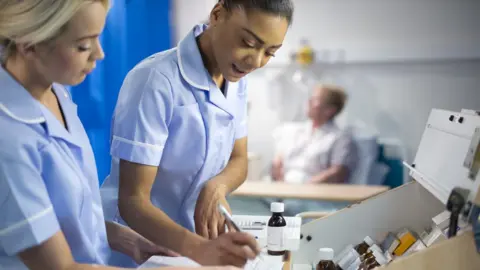 Getty Images
Getty ImagesHealth Secretary Matt Hancock has braced the UK for "quite extraordinary interventions that you don't normally have in peacetime" to combat the coronavirus pandemic. But what are these interventions and how will they change the NHS?
1. Hotel room or hospital ward?
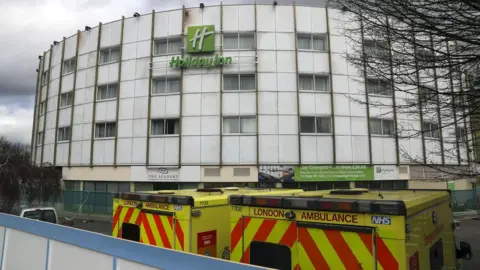 Steve Parsons/PA Wire
Steve Parsons/PA WireThe health secretary said empty hotels across the country would help ease the pressure on hospitals that are filling up with patients.
"Some people are saying: 'Should you build a hospital?'" Mr Hancock told the BBC's Andrew Marr Show.
"Actually, we've seen that many hotels are empty so we've got ready-built facilities for looking after people."
Asked about whether military field hospitals might also be used to spread the load, Mr Hancock said: "I'm open to all options."
He said he was more concerned that enough staff members and equipment were available to cope with an influx in patients, rather than worrying about where those patients would go to receive care.
"The critical thing is that [the hotels] need oxygen supply and the ventilation equipment - whether it's the invasive ventilation or just the mask on your face.
"So what matters is not just the space, it's making sure that the equipment and the trained staff are there as well."

- EASY STEPS: What should I do?
- A SIMPLE GUIDE: What are the symptoms?
- CONTAINMENT: What it means to self-isolate
- LOOK-UP TOOL: Check cases in your area
- VIDEO: The 20-second hand wash

Hotel chain Best Western said it was considering turning some of its properties into temporary hospitals to help the NHS.
Chief executive Rob Paterson said Best Western would discuss the idea this week and "would be willing to take unprecedented steps to support the national effort".
The chain reported an increase in cancellations over the last month as a result of the pandemic.
2. NHS or private hospital?
The Labour Party and the GMB union have called on the government to use empty beds in "plush private hospitals" to ease the pressure on the NHS.
Downing Street confirmed on Sunday that the health service would buy up thousands of beds in private hospitals if they were needed to cope with a surge in patient numbers.
The government said "negotiations" with private healthcare providers have already begun.
But the GMB union is calling for these beds to be given to the NHS for free.
"This is a public health emergency, not a business opportunity for shoddy private healthcare chums to profiteer from distress," said GMB's Rehana Azam.
3. Ventilators made at car factories
How will thousands of new ventilators - machines needed to help patients breathe - be made quickly enough to cope with an increase in demand?
Mr Hancock said there were 5,000 ventilators available in the UK at the moment but that many times that number would be needed as the number of people with Covid-19, the disease caused by coronavirus, increased.
Asked if the likes of military engineers and car manufacturers would be asked to meet the demand, the health secretary said: "Yes, we're talking to all those companies."
"We've got high quality engineering in this country. And we want anybody who has the manufacturing capability to turn to the manufacture of ventilators to do that," he added.
The speedy manufacturing might not stop once the UK has enough ventilators either, with Mr Hancock suggesting the equipment could be sent abroad to help other countries in need.
Digger manufacturing company JCB confirmed Prime Minister Boris Johnson had asked if they could help to make ventilators.
Chairman Lord Bamford said the British company - which cut production and working hours in February as coronavirus led to a shortage of components - would do "whatever we can to help during the unprecedented times our country is facing".
Allow X content?

4. Operating theatres converted into wards
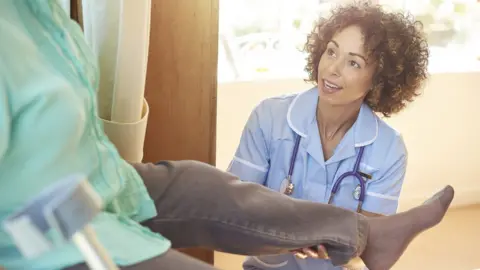 Getty Images
Getty ImagesThe cancellation of swathes of non-urgent - or "elective" - surgery will help to free up space, Mr Hancock said.
He said the sorts of operations that could be delayed "in this emergency" situation included hip and knee operations.
Operating theatres where these procedures are normally carried out are equipped with oxygen supplies, meaning they "can be turned into wards" for coronavirus patients.
This measure is "one of the first things that we're going to do", he added.
5. New (and old) staff
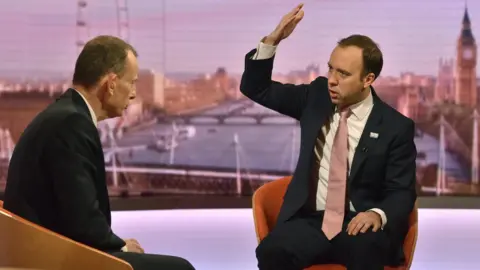 Jeff Overs/BBC
Jeff Overs/BBCAll those extra ventilators will throw up another problem - there are not enough trained nurses and doctors to operate them.
To fix this, Mr Hancock said the government wanted to bring recently-retired doctors "back into service".
But, the health secretary said, some of those workers would need to be trained up to deal with the specific needs of Covid-19 - which is a respiratory disease,
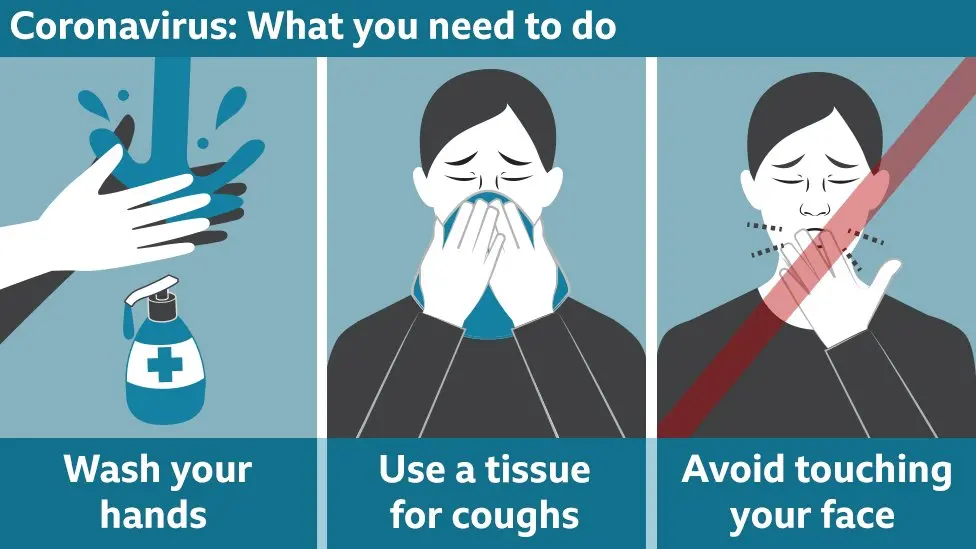
"We will be stopping some other activity, and asking doctors who normally do other things to retrain to be able to, for instance, use the ventilators."
He would not say how long it might take to train people up but did say: "We will do it as fast as we can."
